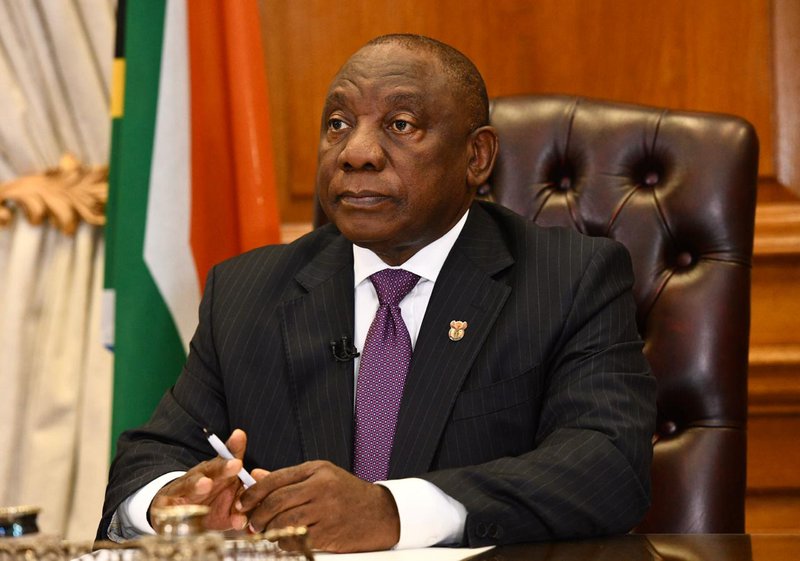Ramaphosa will use corruption to divert attention from vote buying, say analysts
‘This is a chance for him to throw down the gauntlet to the Magashule group.’

President Cyril Ramaphosa.
As he fights the biggest battle of his political life this weekend, Cyril Ramaphosa is going to turn national anger about Covid-19 related corruption into a weapon to fight off those baying for his blood.
The national executive committee (NEC) meeting has taken on the nature of an attempted palace coup to oust the president, but he has a few surprises for those who think he is weak and vulnerable.
Although the looting of Covid-19 emergency funds by highly placed ANC cadres has reflected badly on Ramaphosa’s administration, he is expected to use his commitment to punish those responsible as a way to deflect the NEC debate away from alleged vote buying at the organisation’s 2017 Nasrec conference.
By pushing his pledge to clean up the ANC, Ramaphosa will also throw down the gauntlet to those loyal to secretary-general Ace Magashule and Jacob Zuma, who are themselves badly tarnished by allegations of corruption and state capture. Political analyst Professor Mcebisi Ndletyana from the University of Johannesburg and political economy analyst Dr Daniel Silke agree that Ramaphosa is in a better position to deal with his opponents because the meeting will discuss corruption in the party, including the issue of former eThekwini mayor Zandile Gumede.
“The odds are in Ramaphosa’s favour. This is a chance for him to throw down the gauntlet to the Magashule group. Any wishywashy settlement they reach at the NEC will be detrimental to Ramaphosa and his fight against corruption. He must assert his authority because he has the support society,” Silke said.
Silke said if Ramaphosa missed this opportunity to deal with his opponents, he would be exposed as being a weak leader. This would make him vulnerable to those who want to topple him and he could face a societal backlash. “Ramaphosa must use the advantage he has as the president. This is his opportunity,” said Silke.
Ndletyana said Ramaphosa had been emboldened by South Africa’s outcry against ANC corruption around personal protective equipment and the support he received to deal with the graft.
As far as the allegations about vote buying by the Ramaphosa faction at Nasrec go, the analyst said the president’s opponents within the ANC had no case because all sides used money to attract votes at Nasrec, including all the presidential candidates. Those who were up against Ramaphosa included Nkosazana Dlamini-Zuma, Lindiwe Sisulu, Jeff Radebe, Baleka Mbete and Zweli Mkhize.
“Whatever issue they raised against Ramaphosa will not be credible, but would be seen as seeking to divert attention from themselves. The claim that Ramaphosa used money to buy votes is a nonstarter because all of them used money. That was the norm in the ANC,” Ndletyana said.
Ramaphosa has been accused within his own party of failing to act on corruption since he assumed office in 2018 and even his allies in Cosatu are planning to protest against his inaction on graft. The federation, which supported Ramaphosa’s election as ANC president, resolved to march against corruption that occurred under his administration.
Both Umkhonto we Sizwe Military Veteran’s Association spokesperson Carl Niehaus and former ANC Youth League deputy president Andile Lungisa have time and again raised the vote-buying issue. Niehaus, a close ally of Magashule and a staunch follower of Zuma, said the ANC must walk the talk on corruption if it is to be taken seriously.
He said the allegations against Ramaphosa are a precondition for the NEC meeting and must top its agenda. Niehaus said resolutions taken at all ANC national conferences were implemented, therefore Nasrec resolutions must be implemented as well. He was referring to the anticorruption decision that compelled members to step aside when they were under investigation.
“We cannot pass resolutions and not implement them. The ANC must outlaw bribing or the use of money to buy votes within the organisation,” said Niehaus.
Silke said the Zuma/Magashule group was trying to create what he termed “equivalency of misdeed” to say there were misdeeds in the Ramaphosa campaign. The aim was to neutralise the allegations facing Magashule and others in that camp.
“This is a political chess game being played here.”
Similar sentiments was expressed by Benedict Dube, another analyst, who said the aim of the Magashule camp was to strike a compromise from the Ramaphosa side so that nobody was charged because “everybody is guilty”.
– ericn@citizen.co.za
For more news your way, download The Citizen’s app for iOS and Android.
For more news your way
Download our app and read this and other great stories on the move. Available for Android and iOS.









